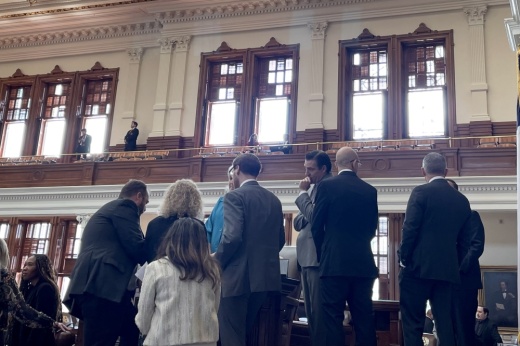“I believe that we need to... do everything we can at the state level to provide lower taxes to our constituents,” bill sponsor Rep. Morgan Meyer, R-University Park, said on the House floor Aug. 25.
House lawmakers substantially amended Senate Bill 10, which was approved by state senators on Aug. 19. The Senate’s version of the bill would have tightened the voter approval rate to 2.5% and imposed the changes only on cities and counties with more than 75,000 residents. House lawmakers sought to apply a 1% threshold to all cities and counties, regardless of size.
Cities and counties’ public safety expenditures, such as salaries and equipment for police, firefighters and paramedics, would not be subject to the 1% limit.
SB 10 passed the House with a 78-52 vote and was sent back to the Senate. If senators do not agree with the changes made to the bill, they can request that a conference committee be formed to hammer out the details behind closed doors.
Public school districts, which can raise property tax rates by 2.5% per year without voter approval, would not be impacted by SB 10.
Zooming in
On the House floor Aug. 25, lawmakers from both political parties criticized the Senate’s version of the bill. Democrats said that tightening limits on tax rate increases would make it hard for cities and counties to cover rising expenses due to population growth and inflation, while Republicans argued that many Texans would not see the benefits of the legislation if it was restricted to communities with over 75,000 residents.
“I don't see how there's not a public safety hit that our local governments are going to take,” Rep. Chris Turner, D-Grand Prairie, said. “Then they're going to have to go to the voters every year simply to approve maintaining existing fire and police staffing levels.”
Public safety expenses make up a large part of local budgets. According to previous Community Impact reporting, the city of Austin estimated it would spend about 64.5% of its $1.46 billion general fund for police, fire and emergency medical services in fiscal year 2026, which begins in October.
Meyer said that if local governments need more revenue to recruit and retain first responders, “this bill will have no impact on that.” He emphasized that SB 10 would adjust when cities and counties need to “present their case to their constituents” before raising taxes—but would not stop them from doing so with voter approval.
“Part of the reason for this bill is to make cities and counties accountable to our constituents,” Meyer said before House lawmakers approved the public safety exemption. “It's making sure cities and counties plan accordingly, and if they do that, they should be able to cover all of their core services.”
Rep. Mitch Little, R-Lewisville, said his constituents would save about $10-$15 per year under the 2.5% limit approved by state senators.
“The people in my district who have calculated this tax relief anticipate that it's going to be roughly equivalent to [the cost of] a Starbucks run,” Little said.
Meyer told House members he could not estimate how much the average taxpayer would save under SB 10, because there are “too many variables” in city and county budgets.
In early August, Richardson City Manager Don Magner said that his city would lose about $750,000 in property tax collections if the Senate’s version of the bill became law. The city has not publicly commented on the House proposal.
“The city opposes any measure that compromises its ability to responsibly manage the resources entrusted to it by Richardson residents and businesses,” Magner told Community Impact in an email. “To that end, we oppose any legislation that seeks to impose a lower revenue cap or otherwise restrict overall expenditures to maintain local control.”
How we got here
Gov. Greg Abbott has encouraged lawmakers to make it harder for local governments to raise tax rates, declaring in February that “no taxing entity should be able to raise your property taxes without a two-thirds approval by voters.”
“That would lead to bona fide property tax cuts [and] lower property tax bills for our constituents,” Abbott said in a June 11 interview. “That will be a keen focus of mine going forward.”
Abbott and some lawmakers have noted that homeowners do not always see the benefits after the state expands property tax exemptions, which they said can be “wiped out” by local tax hikes.
Property taxes are charged by local entities such as school districts, cities, counties, hospital districts and municipal utility districts. To drive down taxes, lawmakers must “come in here every single session and devote larger amounts of money... just to maintain the property tax cuts we've already put in place,” Abbott said in June.
Legislators set aside $51 billion, or about 15% of Texas’ $338 billion budget, to maintain existing property tax relief and increase tax exemptions for homeowners and businesses during the 2026-27 biennium.
Also of note
House lawmakers also passed House Bill 17, which would require cities, counties, school districts and other taxing entities to mail notices to residents before holding public meetings on changes to their proposed tax rates. Under current law, entities must publish notices in their local newspapers.
“Too many families are left in the dark with how [tax] rates are set and what the financial impact is,” Meyer said Aug. 25. “Public participation at rate hearings is consistently low, raising concerns that critical decisions are being made without adequate scrutiny or taxpayer input.”
The notices would also be required to include information about what the tax rate was in the previous year and by what percent it would change.
HB 17 was approved with an 83-48 vote and sent to the Senate on Aug. 25.





